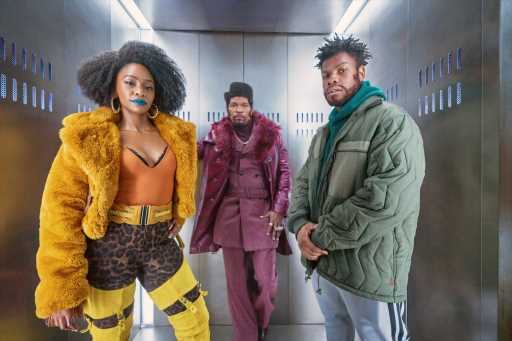In America today, no one has a lock on conspiracy theory. It has become the air we breathe, the Kool-Aid we drink, the rabbit-hole ideology that defines too many of us. Yet conspiracy theories come in different shapes and sizes. Many are false, some are true. Many are bat-house crazy, some are more than plausible. All, in one way or another, work as metaphors: for the forces (within government, corporations, whatever) that collude in hiding things from us, for the sinister tantalizing truth that we aren’t allowed to see.
“They Cloned Tyrone” is a slow-burn inner-city sci-fi nightmare thriller, one that plays off the spirit of conspiracy theory that has often thrived — with justification — within Black culture. The Tuskegee experiment was a conspiracy that happened; its horrific impact on the hearts and minds of African-Americans is beyond measure. And in the 1970s, the belief that the CIA, linked by the war in Vietnam to the Golden Triangle (the source of most of the world’s heroin), was dumping drugs into America’s inner cities was a notion that gained currency, culminating a decade later in the theory that the CIA was the hidden force behind the crack epidemic.
Those theories, and the palpable sense of just-because-it’s-extreme-doesn’t-mean-it’s-not-true that underlies them, are the paranoid deep background of “They Cloned Tyrone,” a movie that pushes things to an extreme but still wants to touch a nerve of reality.
It begins as the grounded drama of three vivid bottom-rung criminals. There’s John Boyega as Fontaine, a drug dealer who one character says has never laughed, and we look at Boyega, sullenly impassive in his gold grillz (he gives a quietly implosive performance unlike anything he’s done before), and can believe that’s true. There’s Jamie Foxx as Slick Charles, a pimp in a sculpted ‘fro and paisley bathrobe who has seen better days (“I was a 1995 International Players Ball pimp of the year!”), and who rules his roost with a cold-as-ice bravura that, as the wily Foxx plays it, is as entertaining as it is convincing in its small-time megalomania. And there’s Teyonah Parris as Yo-Yo, a sex worker who earns her keep under Charles, and who stands up to him in as hostile and rococo obscene a fashion as he does to her.
The filmmaker, Jule Taylor, has never directed a feature before (he was a co-writer on “Creed II”), but he stages scenes with a visually impressive mood of funky gloom. The dialogue, which he wrote with Tony Rettenmair, is fast and vivacious in its salty-dog rage. And the actors are so good that I would have been happy if the movie had simply followed the day-to-day fates of these three characters.
For a while, it immerses us in the dailiness of life in a district called The Glen, as Fontaine goes through his morning ritual of buying a 40 and a scratch-off card and pouring a shot of the beer into the cup of a homeless old man, Frog (Leon Lamar), who offers him a daily aphorism (“It’s in the water, young blood,” he says — talk about conspiracy!). David Alan Grier shows up as a gospel preacher in full cry, and for five minutes he’s so mesmerizing that he just about hijacks the movie.
But the very title of “They Cloned Tyrone,” an allusion to Erykah Badu’s 1997 live-concert track “Tyrone,” lets you know that this is not just going to be some slice of hood life. There are lethal scuffles over cash, and a key character winds up dead, shot several times through the torso.
One scene later, he’s alive and well.
Dark doings are in the offing. But who’s doing what to whom? Let’s just say that there’s a conspiracy at hand that makes the one in “Get Out” look like an amateur parlor trick. At one point, the three characters enter a deserted trap house, only to discover a gleaming elevator that whisks them to a laboratory below. There, they find a white powder that resembles cocaine (but isn’t), as well as a white geek in a lab coat and hair that looks like he stole it off Roberta Flack. This produces a giant collective “Say what?,” a feeling that’s only enhanced when our trio visit the local fried-chicken joint and discover that the chicken isn’t just tasty, it’s making everyone in the place collapse into giggles. The white powder is in the chicken!
So if fried chicken is part of the conspiracy, what else about their lives is? Answer: everything. The drugs. The violence. The gospel church. The hip-hop strip club. “They Cloned Tyrone” is “Get Out” meets “The Truman Show,” with a bit of the “John Wick” series’ the-top-level-rules-it-all world-building. By the time Fontaine busts down the bedroom door that his mama is always talking to him from the other side of, only to discover that “mama” is a speaker box, we’re not in Kansas — or The Glen — anymore.
On paper it all sounds sinister and intriguing. Yet just as our eyes should be widening at the cosmic paranoia of it all, we’re thinking, “Wait, how does this conspiracy actually work?” What it involves is clones, a shell game of illusion, a vast underground network of sinister but innocuous white men in control of everything…and more clones. It should all feel threatening, but instead it feels half-baked in its grandiosity. Simply put, “They Cloned Tyrone” has a good set-up, but the film is too sketchy and conceptual to work as a bad-dream thriller. Yet it establishes Jule Taylor as a director of craft and a certain audacious nerve. Next time I hope he trades conspiracy for reality.
Read More About:
Source: Read Full Article
